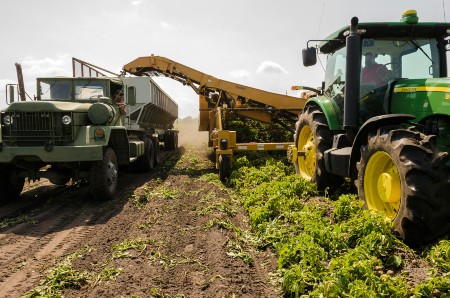We ask you, urgently: don't scroll past this
Dear readers, Catholic Online was de-platformed by Shopify for our pro-life beliefs. They shut down our Catholic Online, Catholic Online School, Prayer Candles, and Catholic Online Learning Resources essential faith tools serving over 1.4 million students and millions of families worldwide. Our founders, now in their 70's, just gave their entire life savings to protect this mission. But fewer than 2% of readers donate. If everyone gave just $5, the cost of a coffee, we could rebuild stronger and keep Catholic education free for all. Stand with us in faith. Thank you.Help Now >
America's Agricultural Shift: How the U.S. Is Becoming a Net Food Importer
FREE Catholic Classes
The United States, long known as one of the world's agricultural powerhouses, is now facing a significant shift in its food production and trade dynamics. For the third time in five years, the U.S. is poised to become a net food importer, meaning it will import more food than it exports. This marks a dramatic shift for a country that has traditionally enjoyed an agricultural trade surplus, exporting more food than it brings in.

Image Credit: Mark Stebnicki on Pexels
Highlights
The Agricultural Trade Deficit
In 2023, the U.S. agricultural trade deficit reached nearly $20 billion, and this gap is expected to widen in 2024. Several factors contribute to this growing deficit, including increased demand for imported products, production challenges, and a strong U.S. dollar. U.S. consumers are buying more foreign agricultural products than ever before, such as tropical fruits (e.g., avocados and bananas), coffee, and specialty items that are not widely grown domestically.
The increased import demand reflects shifts in consumer preferences, as Americans seek a more diverse array of foods, including those that cannot be easily produced within the U.S. Furthermore, the strength of the U.S. dollar has made imported goods more affordable, driving up imports while making U.S. agricultural exports more expensive and less competitive in international markets.
Why Are Imports Outpacing Exports?
Several key factors explain the rising agricultural trade deficit. One major factor is the strength of the U.S. dollar. When the dollar is strong, it increases Americans' purchasing power, making foreign goods cheaper to buy. Simultaneously, U.S. exports become more expensive for other countries, reducing demand for American products on the global market. As a result, U.S. farmers face tougher competition from foreign producers, who can offer similar goods at lower prices.
Another important factor is the changing tastes and preferences of U.S. consumers. The U.S. population has become more diverse, and with that comes a growing demand for food products not traditionally grown or produced domestically, such as tropical fruits and certain spices. The increased reliance on imports from countries with different growing seasons or climates allows consumers to access a wider variety of foods year-round.
However, this growing demand for imported goods means that even as U.S. agricultural production remains strong, imports have surged ahead. For example, agricultural imports are projected to grow at an annual rate of 6% through 2031, while exports are expected to rise by just 0.8% during the same period.
What Does This Mean for the Future?
The U.S. becoming a net food importer raises questions about long-term food security. A reliance on imported food can make the country more vulnerable to global supply chain disruptions, such as those experienced during the COVID-19 pandemic. Additionally, concerns have been raised about the environmental impacts of transporting large quantities of food over long distances, contributing to carbon emissions and other environmental challenges.
Moving forward, the U.S. may need to reconsider its agricultural priorities. Shifting more focus toward growing food for domestic consumption rather than producing commodities for export could help to address some of these concerns. Additionally, addressing the structural issues that contribute to the trade deficit, such as the strength of the dollar and competitive pressures from global markets, will be important for ensuring the sustainability of U.S. agriculture.
In conclusion, the shift from being a net food exporter to a net food importer signals a significant change in the U.S. food system. While it reflects the global nature of food production and consumption today, it also raises important questions about food security, trade policy, and the future of American agriculture.
------------------------------------------------------------------------------------------
Your support makes stories like this possible!
Catholic Online is completely donor supported, allowing us to report on what truly is happening in the world, free of charge and uncensored. A donation to Catholic Online will ensure millions around the world can continue to come to our site to find the faith people are so desperately searching for in life.
Join the Movement
When you sign up below, you don't just join an email list - you're joining an entire movement for Free world class Catholic education.
Our Important Lenten Message - Please Watch
- Easter / Lent
- 5 Lenten Prayers
- Ash Wednesday
- 7 Morning Prayers
- Mysteries of the Rosary
- Litany of the Bl. Virgin Mary
- Popular Saints
- Popular Prayers
- Female Saints
- Saint Feast Days by Month
- Stations of the Cross
- St. Francis of Assisi
- St. Michael the Archangel
- The Apostles' Creed
- Unfailing Prayer to St. Anthony
- Pray the Rosary
![]()
Copyright 2026 Catholic Online. All materials contained on this site, whether written, audible or visual are the exclusive property of Catholic Online and are protected under U.S. and International copyright laws, © Copyright 2026 Catholic Online. Any unauthorized use, without prior written consent of Catholic Online is strictly forbidden and prohibited.
Catholic Online is a Project of Your Catholic Voice Foundation, a Not-for-Profit Corporation. Your Catholic Voice Foundation has been granted a recognition of tax exemption under Section 501(c)(3) of the Internal Revenue Code. Federal Tax Identification Number: 81-0596847. Your gift is tax-deductible as allowed by law.








